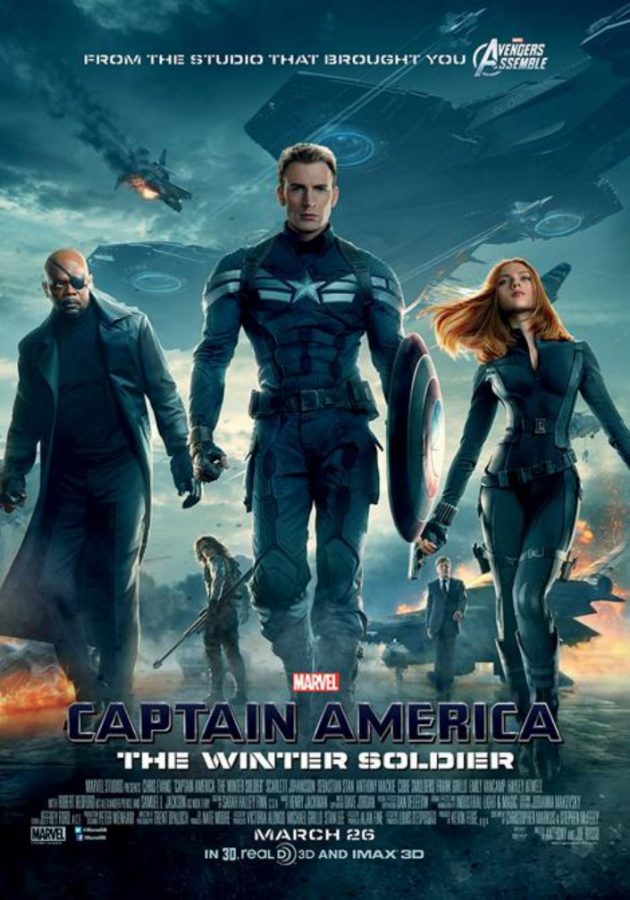In the purgatorial void between “The Avengers” and the upcoming sequel, Marvel fans have been treated to sequels portraying the heroes in the next stage of their narratives. Without forcing exposition, sequels can take the time to flesh out characters and adapt them for the modern age.
No hero is better suited for evolution than Captain America, who questions his role in the latest Marvel release “Captain America: Winter Soldier”. In this film, Captain America (Chris Evans) searches for his role in an increasingly militarized United States and S.H.E.I.L.D. operated by the mysterious Nick Fury (Samuel L. Jackson). When an assassin known only as the Winter Soldier starts hunting down members of S.H.E.I.L.D., Cap and Black Widow (Scarlett Johansson) work to uncover of the greatest historical conspiracy in world history. While an action-packed two and a half hours, the film neglects essential responsibilities in recreating the American hero.
Like all post-“Avengers” films, “Winter Soldier” possesses the advantage of character development. One could argue Captain America as a frontier hero, existing on the outer edge of society while vying for inclusion through updating himself on movies, music, and history. The film presents an interesting opportunity to redefine the characteristics of Captain America, a fact the character of Phil Coulson alluded to in “The Avengers”. Those knowledgeable in the history of the Vietnam War recognize connotations of ‘Winter Soldier,’ referring to a speech delivered by Secretary of State John Kerry, detailing the horrors faced by soldiers coming home from Vietnam.
This speech gained public attention, fueling criticism of the American presence in the Asian theater. Captain America, a relic of post-WWII optimism, must deal with the growing domestic feelings of isolation through philosophical discussions with Nick Fury. The film advances these themes by subtly introducing issues of American foreign policy: militarization, rise of numerous actors of foreign policy, and their battle for influence. This interpretation appears as over-analysis, but considering the importance of comics to convey societal context, the film establishes political literacy for an isolated public.
Of course, this film offers more than analysis for history and political science nerds. It continues the strong slew of sequels leading out of “The Avengers.” Chris Evans commands—so to speak—his return to the role of Captain America while maintaining remarkable chemistry with Scarlett Johansson as the Black Widow. Marvel fans will also enjoy the connection with the cannon and fill some of the holes the first film left behind. With that being said, some problems remain.
The film could have ended a have ended a half hour earlier, removing some unnecessary battle scenes and repetitive dialogue. While Black Widow did not receive the full Marvel film treatment of becoming overtly sexualized, moments of flirting generated false suspension. The real tension laid with Captain America searching for his role in modern society. The film presents this opportunity for transformation but it fails to materialize.
Cap perpetrates traditional notions of the American identity, lacking in representation. Removal of this tension weakens the film’s complexity, making “Winter Soldier” the weakest of the post-“Avengers” Marvel sequels.
Barring cultural analysis, see the film to prepare yourself for “The Avengers: Age of Voltron” coming out next summer. Or to watch the trailer for “Guardians of the Galaxy”, despite having already watched it on repeat since it was released.
Rating: 2.5 out of 5.
AUTHOR’S NOTE: This is my last movie review after a wonderful three-year career at The Communique. I would like to thank newspaper staff and a community of supporters who believed in my work and made my reviews more intriguing with their scintillating discussion. I am ridiculously proud of the work I accomplished here. To quote from War Kong-Wai’s “In the Mood for Love”: “I didn’t mean to fall in love with you. Feelings just creep up on you like that.”


